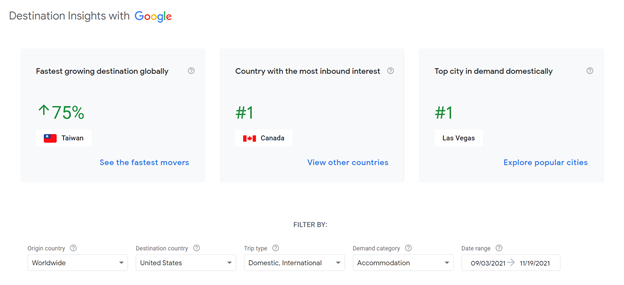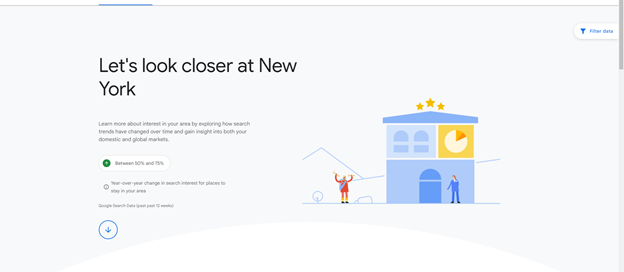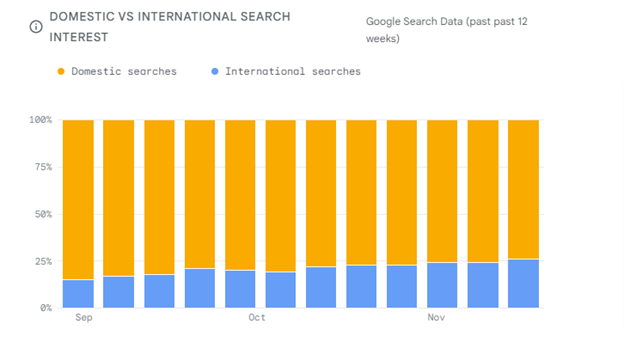Travel and tourism have been extremely competitive in recent years, with hotels and chains competing against online travel agencies (OTAs) and booking sites in increasingly rich search results.
Now, the industry has also been significantly impacted by the COVID-19 pandemic and is still feeling heavy repercussions.
There are signs of life as people start to travel again with the pandemic abating in some states and countries.
But user behavior has nevertheless changed dramatically, so hotel brands must shift their SEO strategies to drive incremental bookings, traffic, and revenue if they hope to acquire travelers now and in the near future.
Here is a list of strategies, tactics, and tools to help accomplish that goal with SEO best practices for hospitality in 2022 and beyond.
Prioritize Destinations Through Data
For prioritizing locations and making sure your hotel is ranking in top positions, look no further than Destination Insights with Google.
In the travel industry, where people are going is particularly important. Let the data tell you this, so you can compare trends and focus on making sure you have great visibility for those destinations.
 Screenshot by Author, November 2021
Screenshot by Author, November 2021For example, the top destination in the U.S. from 09/03 to 11/19 was Las Vegas.
Advertisement
Continue Reading Below
If I were working with a hotel like the Bellagio, I would make sure I am ranking on the first page for Las Vegas hotels, brand, brand + geo keywords, restaurants, COVID precautions, and other associated keywords.
Another great tool to provide insights for your SEO strategy is Hotel Insights by Google. It gives you data on who is searching to stay in your area, in addition to tools and tips to make your business stand out from the competition.
Looking at data below from the New York area, where consumers looking to book travel are up 50% to 75% year over year (YOY).
 Screenshots by Author, November 2021
Screenshots by Author, November 2021If you are a travel brand in the area, this is a good insight to help you focus on destination pages. Review existing content and your striking distance keywords for opportunities to build out or repurpose content with things to do nearby and events in the city.
Advertisement
Continue Reading Below
Another excellent feature of this tool is you can see if users are searching for this information from the U.S. or overseas. This could help plan out your content strategy and PPC campaigns to target international travelers and reach even more potential guests.
 Screenshot by author, November 2021
Screenshot by author, November 2021Satisfy Travelers’ Needs With A Brand Concierge Strategy
You should also always have content that meets the intent of the traveler and satisfies your own desire to demonstrate Expertise, Authoritativeness, and Trustworthiness (E-A-T).
The path to booking a hotel room is not a linear process. Before a traveler books a trip and comes to a hotel site, there are many considerations that come into play:
- Does the destination appeal to me?
- What is there to do?
- What is nearby?
- How are the restaurants?
- Do they serve vegan food?
These are just examples, of course. There are potentially thousands of combinations of preferences.
Travelers are conducting research sometimes months in advance. Ninety-one percent of travelers turn to search engines when looking for a place to stay and the majority (81%) prefer to use Google as their source of travel inspiration.
That’s why hotels need an SEO brand concierge strategy to connect with travelers throughout the user journey.
That includes a holistic content strategy and a deep understanding of guest profiles, which should include generational segments such as Millennials and Boomers as well as interest-based segments such as Adventurers and Foodies.
Advertisement
Continue Reading Below
Each of these segments requires content that speaks to individual travelers and this content must be placed above the specific hotel destination as well as within.
For a hotel brand website to rank well for “Foodie Destinations” or “Dining Experiences Around the World,” for example, it needs content that curates the types of experiences that exemplify the purpose of a concierge.
These experiences cannot just be about what the hotel brand offers. Think about it: How would you rate your experience with a concierge if they only recommended the restaurant in the lobby?
The brand concierge strategy requires rethinking hotel brand websites and the role they play in connecting with travelers through persona identification, journey mapping and content.
This type of strategy requires an understanding of search, the connections between topics, and the intent stages of the queries that are made throughout the traveler’s journey.
Optimize Your GMB And Local Listings
By optimizing your Google Business Profile, your hotel listings can show up in the Map Pack in addition to being listed in the regular organic listings on the page for geo-modified keywords.
Advertisement
Continue Reading Below
This can drive incremental revenue, bookings, and organic traffic.
Fully optimized listings help prioritize your business to ensure your hotel listings show up at the top of local searches and provide a consistent customer experience to drive bookings and retention.
Here are my top tips to do just that:
- Optimize your listings across key search engine directories. Create Google Posts and optimize photos so travelers can see the hotel.
- Manage and respond to reviews. Local reviews are considered the most useful content potential guests leverage when making their decisions. Respond to reviews to show you value your customers and the feedback they leave about your business. This is crucial because Google rewards businesses that respond to their reviews with higher rankings.
- Respond to Q&A and create an FAQ section so your hotel brand will be able to control the conversation about your business.
- Ensure your Google Maps pin is in the correct location so users can find your hotel.
- Show nice photos and videos of the hotel, rooms, and amenities like the restaurant(s).
- Use attributes to differentiate your location and provide additional details relevant to travelers about health and safety precautions, Wi-Fi, accessibility, etc.
- Always keep hotel, restaurant, spa, and other hours up to date so the user knows when they will be open and closed.
Work With Your Social Media Team
Share content about the most popular destinations, travel tips, hotel offerings, events and nearby attractions.
This can help maximize visibility, build more brand exposure and generate more links and buzz about your hotel, which can have a positive impact on your visibility, traffic, and revenue.
See Content Repurposing for Travel Brands: A Complete Guide for more tips and tricks to get the greatest mileage out of your content across platforms.
Optimize For Core Web Vitals
In a competitive industry like travel and tourism, it’s important to optimize your site for Core Web Vitals.
Advertisement
Continue Reading Below
These three combined metrics are used to measure a website across a series of key performance indicators that became a ranking signal in May 2021. They include:
- How long it takes for the main part of a webpage to load (LCP).
- How long it takes the webpage to become interactive (FID).
- How much the webpage layout moves around when loading (CLS).
In order to improve on CWV, hotel sites should have clean code, use a CDN for heavy images, externalize JS and CSS, and be mobile friendly and secure, etc.
There’s no penalty for not optimizing to CWVs, but it could be the factor to give you the boost that moves you past tough competitors.
Leverage FAQs And Be Ready For Voice
Your potential guests are asking questions and your hotel brand should have the answers. Place FAQs on your site to help current and future guests find the information they need, which can also help minimize calls to the hotel.
The FAQs should be marked up with structured data so they can show up in rich results and maximize organic search potential.
Advertisement
Continue Reading Below
With consumers using voice search, your content must be optimized for voice search as well:
Hey Google, does the Hilton in Boston have a swimming pool?
If your brand comes up as a response to a voice search query like this, it can help influence whether a user decides to book with your hotel.
Monitoring Competitor Visibility And Performance
The way consumers search for hotels has changed. That’s why it’s important to always monitor your competitors’ rankings and see:
- What content they are building.
- What market share they own.
- What new SEO strategies they are trying.
- How they are getting links.
- And how fast their pages load, etc.
From there, figure out what tactics and strategies you can glean that may be worth testing out.
Sometimes brands do not like to add content to their sites because they don’t want to interfere with the user experience. But the odds are pretty good that your competitors are adding content.
Advertisement
Continue Reading Below
And if you find one of your biggest competitors has added content to a key destination page and the content has FAQs and it is marked up with structured data and they now rank on the first page for a key destination term, they’re potentially getting incremental bookings, improving brand awareness, etc.
That’s why it may be worth building out and promoting content to keep up and even outperform the competition.
Wrapping Up
The pandemic has impacted every aspect of life, including the travel and tourism industry. Hopefully, things will get better soon and travel will return to pre-pandemic levels.
For now, hotel brands need to be flexible and try out new content ideas and SEO strategies, as well as monitor competitors and understand their guests.
By knowing who travelers are, what they want, and how to engage them with content that satisfies their information need, travel brands can drive incremental bookings, traffic, and revenue.
More resources:
Advertisement
Continue Reading Below
Featured image: Shutterstock/LanKogal

If some one wants expert view about running a blog then i suggest
him/her to visit this webpage, Keep up the good work.